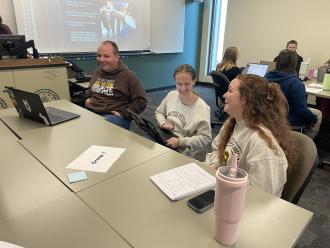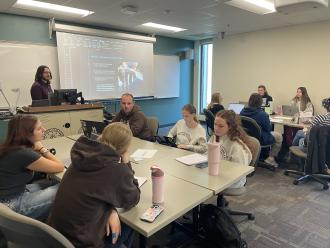Recent grad credits Global Studies in the Field course, Global Engagement Program for career growth
KALAMAZOO, Mich. - WMU alumnus Molly Dixon never thought that a class she took her first-year on campus would send her on journey to Central America and help her land her first job in international education. Yet today, the 2024 graduate, says the lessons she took from GIST 3100: Global Studies in the Field have taken on a new importance as she starts her role as the international student events coordinator for the Haenicke Institute for Global Education.
"GIST 3100 opened my eyes to the value of networking and making connections in a globalized world,” says Dixon, a 22-year-old from Grand Rapids. “It also made me realize that looking through life and issues from a multicultural perspective not only makes you a better person, but also more capable and employable.”
GIST 3100: Global Studies in the Field is a course run by the College of Arts and Sciences' School of Environment, Geography and Sustainability in collaboration with the Global Engagement Program, an initiative of the Haenicke Institute for Global Education.
In the class, students explore the culture, history, politics and social institutions of countries they hope to visit while learning to adapt to new environments and communicate across cultures. The course prepares students to leverage their global knowledge and experience with prospective employers.
'Internationalization at Home'
“The course is designed to prepare students not only for study abroad experiences but also for broader forms of international engagement, such as internships or short-term visits,” says Dr. Anezka Viskova-Robertson, the former global learning manager at the Haenicke Institute. “WMU is committed to comprehensive internationalization, including ‘internationalization at home’— global experiences for all students through global learning opportunities on campus.”
The Global Engagement Program (GEP) is a no cost initiative designed to accommodate all WMU students—regardless of background, experience or major. Through participation in global events and courses, students earn different statuses like Global Bronco, Global Explorer and Global Citizen. Each status comes with unique rewards, including scholarships for studying abroad. Nearly 180 students were recognized for earning a new GEP status last year. Students at WMU are automatically enrolled in the GEP and some 11,000 are actively engaged.
Even for students who are unable to study abroad, GIST 3100 and the GEP offer great opportunities to learn about the world, says Dixon, who majored in Spanish. Participants hear from guest speakers, attend cultural events and interact with people from around the globe. Students from 95 foreign countries attend WMU.
“WMU gives you the tools to understand the ideas and problems you hope to solve in your chosen field," she explains. “GIST 3100 and the Global Engagement Program allow you to connect those ideas and challenges to similar issues and diverse perspectives across the world.”
More than 460 students at WMU studied abroad last year. Dixon went to Costa Rica as a sophomore before returning to campus and securing an internship with the GEP. “GIST 3100 made me see that traveling in general is not as scary as I thought it was, and it gave me the confidence to study abroad for a whole semester even though I had never left the country prior,” she says.
In the Classroom
Class assignments at Western often transcend traditional academic coursework to experience-driven learning, preparing students to become conscientious citizens in a globalized world, says GIST 3100 Professor William McQuitty.
In one of the last classes before graduation, McQuitty sat in a circle with his students at Dunbar Hall while everyone shared objects of importance to them. He had spent the morning talking about how objects have different meanings depending on historic context, cultural perspective and personal connection, providing examples from mass media, pop culture and history.
Objects take on different meanings to different people, McQuitty said. “A big part of this class is becoming more aware of not just that international countries have different assumptions and different cultures, but also that we have our own assumptions and our own culture that others might think of as different,” he said.
Sitting in the circle with his students, McQuitty showed the class his laptop and talked about how it symbolized not just technological advances and a connection to the gaming community, but also his escapism from some of the hardest moments of his life—his mother’s death and his divorce. The laptop is now a physical reminder of his personal achievement in overcoming a gaming addiction, he said.
Students showed off key chains, jewelry, musical instruments, a Magic 8 Ball and more as each discussed the deeper meaning their personal items carried and how that meaning has changed over time. “When you are abroad, don’t be afraid to ask questions,” McQuitty told the class. “You can make lasting connections with people if you take the time to learn about them and their world."
Learn More
Find more information about GIST 3100 and the Global Engagement Program on our website. Visit the WMU Study Abroad & Global Engagement Instagram for a video interview with Molly as she explains her new role at the Haenicke Institute for Global Education's International Student and Scholar Services unit.
About The Haenicke Institute for Global Education
The Diether H. Haenicke Institute for Global Education, established in 1998, fosters an environment that supports the global engagement of the Western community. Its offices assist nearly 2,500 international students and alumni at home and abroad with admissions, immigration support, student success and post-graduation job training.
The institute also facilitates short- and long-term study abroad programs for students, faculty and staff. It hosts a variety of global learning activities, such as designing and promoting scholarship and academic opportunities on campus; providing K-12 outreach; hosting lectures, panels and events; and showcasing arts, entertainment and culture from around the world. Learn more about the Haenicke Institute for Global Education.
For more WMU news, arts and events, visit WMU News online.





